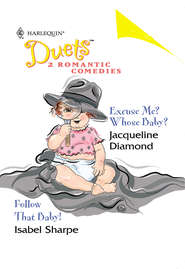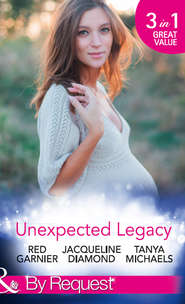По всем вопросам обращайтесь на: info@litportal.ru
(©) 2003-2024.
✖
I Do! I Do!
Автор
Год написания книги
2019
Настройки чтения
Размер шрифта
Высота строк
Поля
He also managed to tell her quite a bit about himself, and especially his relationship with his sister. Until now, Gina had known Mason primarily as Lily and Daisy’s uncle. It was intriguing to glimpse the larger scope of his life and his family.
Margaret, he’d explained, was eight years older than him and had already married and left the Blackstone Bar ranch when their mother died. Mason, who’d been twelve at the time, had helped raise Rance, five years his junior, and had assisted their father on the ranch.
In Dallas, Marge kept a busy schedule. She headed several social committees and ran a charity art gallery and craft shop.
“Why do you suppose she wants to go back to changing diapers and staying up half the night for two babies she’s never met?” Gina asked. “She’d have to give up most of her other activities. And it doesn’t get any easier when they’re toddlers, or teenagers, either! This is a twenty-year commitment.”
She stopped, surprised by her outburst. She didn’t usually state her opinions so boldly.
Mason spread his hands in a gesture of frustration. “Maybe because she knows she can win. What would I say to a judge? ‘Your honor, my brother and I were so close, he and his wife meant everything to me. Their children were going to be my children, too. Now that they’re gone, these girls are all I have left.’ That’s not a strong argument.”
“It ought to be!” Gina said.
“She’ll say she’s better suited in every way to raise the girls, and the judge will agree,” he concluded. “I have to come up with a counterargument. That’s where I could use your advice.”
“I can testify that they never visited the nursery,” she said. “You were there every day.”
“It might not be enough,” he said. “Before I knew for certain that Amy’s parents didn’t want the children, I talked to a lawyer about custody issues. He told me judges have a hard time weighing intangibles like bonding, so they take a by-the-numbers approach. Margaret can list a lot more advantages than I can.”
“Can’t you reason with her?” she asked. “The direct approach is sometimes the best one.”
The waitress stopped to take their dessert order, apple pie for him, sherbet for Gina. When they were alone again, he said, “Reason with her? I tried that this afternoon, on the phone. Margaret didn’t even hear what I was saying. To her, I’m still her kid brother.”
It was hard to imagine how anyone could see Mason as a kid. From across the booth, Gina could feel the heat of the man and smell the leathery fragrance he exuded.
“I wish I could help,” she said. “With all their activities, the Waldmans don’t sound like ideal parents for two medically fragile infants.”
“Medically fragile?” he repeated.
She hadn’t meant to alarm him. “I don’t mean that they’re in imminent danger. But they need extra care.”
“Like attaching the monitors.” He spoke to himself more than to her.
“Yes. Someone will need to check their weight gains, and take their temperatures, and log how much they’re eating,” she explained. “It’s not the sort of thing a person can do easily in between running a store and organizing a charity event.”
“It’s not the sort of thing a person can do while running a ranch, either.” He shook his head. “From a judge’s point of view, this looks hopeless.”
To Gina, the difference was clear. “You’ve got a full-time housekeeper, someone you’ve known for years, who’s dedicated to you. And you won’t get tired of the girls after a few months. You’ve shown you’re willing to sacrifice for them.”
Their dessert came. Mason stared at his apple pie. “You know what I want them to have?” he said.
“Love?” Gina guessed.
“Of course.” He gave her a weary smile. “Also, a sense of belonging. Memories, traditions. The kind of thing you get on a ranch or in a small community.”
She toyed with her sherbet spoon. “I wish I’d had that experience. The places we lived were fascinating, but I never truly belonged in any of them.”
“You must have been close to your parents, though,” he said.
A hollow sensation ran through her. She’d first become aware of it at her parents’ funeral, when she realized that in essential ways they’d remained strangers to her.
“We all kept so busy,” she said. “Dad worked long hours, Mom worked part-time and volunteered at church. I sang in the choir and took honors classes, and was a candy-striper in a nursing home. We hardly ever discussed anything except schedules.”
“Are they still living?” he asked.
“They died four years ago,” she said. “Their boat turned over on Lake Travis. A witness said Mom got trapped and Dad tried to save her.” Tears threatened Gina’s composure, but she held them back. “There are so many things we never discussed, so many ways I never knew them. I’d hate for Lily and Daisy to grow up like that.”
He studied her with an expression she couldn’t read. The silence stretched out before he asked, “How much would you hate it?”
“Hate what?” Lost in a swirl of memories, she could barely remember what they’d been talking about.
“How much would you hate for the twins to grow up without a sense of belonging?” he said. “How much would you hate for them to grow up as cute playthings for a couple who’ll barely have time for them?”
“I’d adopt them myself if I could, that’s how much I care,” Gina answered frankly. “Assuming, of course, that you weren’t in the picture.”
He flinched, and she realized he’d misunderstood. “I meant that of course you have the first claim on them,” she added hurriedly. “Not that I wouldn’t want you around. I mean…” To her chagrin, heat crept across her cheeks.
Mason smiled. “Good. Because I’ve got the most outrageous idea I’m ever likely to have. Want to hear it?”
“Sure,” she said, eager for a distraction from her embarrassment.
“Let’s get married,” he said.
MASON COULD HARDLY believe what he’d proposed. Or rather, that he’d proposed.
The last thing he’d had in mind when he asked Gina to dinner was marriage. Not because he wouldn’t want her. A man would be incredibly lucky to walk an angel like her down the aisle.
He simply wasn’t cut out for marriage. He belonged in the saddle or behind the wheel of a pickup. When he got into one of his black moods, he needed the open range to vent.
Three years ago, he’d fallen in love with Francine Lee, a pretty blond accountant who’d been visiting her brother, the veterinarian in Horseshoe Bend. They’d dated intensely, and she’d prolonged her stay for several weeks.
One night at the ranch, they’d cooked dinner together after giving Bonita the evening off. Mason had planned to pop the question, until Rance hurried in to tell him that a cowhand had ridden one of their horses without permission and treated it so badly the horse had suffered permanent damage.
The man had created problems before, although never anything so serious. He’d been tolerated because he was a friend of their late father’s.
At the news, something had snapped inside Mason. With Francine and Rance watching, he’d hauled the drunken cowboy out of the barn where he was cowering and punched him so hard the man flew across the yard. Mason didn’t remember much else, except that he’d fired the man amid a string of profanities.
Francine had been shocked. “You lost control of yourself!” she’d said. “How do I know you won’t do that again? Maybe next time, I’ll be the one you take it out on!”
She’d refused to listen to his protests, and demanded that he drive her to her brother’s, which he did. The next day, she’d returned to Houston, and hadn’t answered his letter of apology.
Mason knew that emotions could still run away with him under certain circumstances. There was a wildness to him that was part of his nature. He could usually keep it under control, but not always.
Over the years, he’d met rough-and-tumble women who could stand up to him, but none of them had come close to winning his heart. He had to accept the plain fact that he wasn’t suited for marriage to the kind of gracious, tenderhearted woman who appealed to him.
When Rance wed his high school sweetheart, Amy, and she became pregnant with twins, it had seemed like the answer to Mason’s prayers. The future of the ranch would be assured. He didn’t need to marry, as long as he had his brother’s family.
Yet here he was proposing to Gina Kennedy, a woman who was even more delicate than Francine. Was he out of his mind? He was doing it for the twins, though, not for himself.











